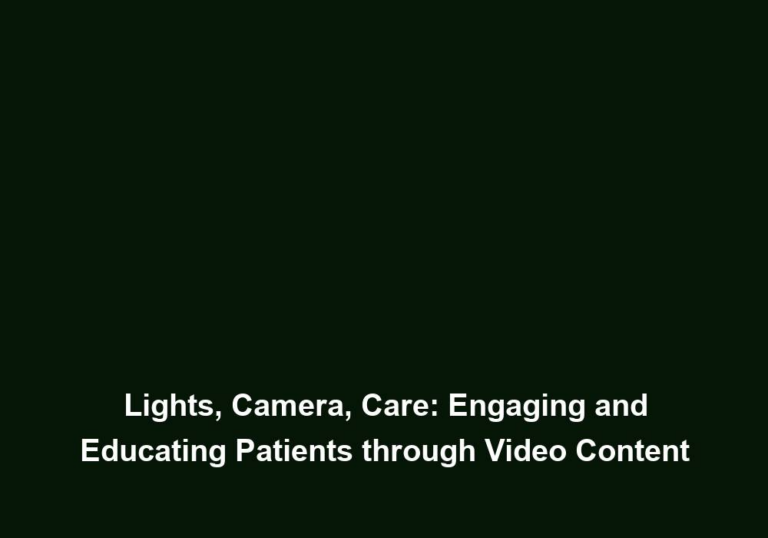Doctor’s Notes: Harnessing Article Writing for Patient Engagement
In the ever-evolving world of healthcare, effective communication between doctors and patients is vital. One powerful tool that doctors can utilize to enhance this communication is article writing. By harnessing the power of SEO content writing, doctors can engage with their patients on a deeper level, providing them with valuable information, promoting health literacy, and building stronger relationships. In this article, we will explore the benefits of article writing for patient engagement and provide valuable insights for doctors looking to incorporate this strategy into their practice.
The Importance of Patient Engagement
Before delving into the specifics of article writing, it is crucial to understand the significance of patient engagement. Patient engagement refers to the active participation of patients in their own healthcare journey. When patients are engaged, they are more likely to understand their conditions, follow treatment plans, and make informed decisions about their health. This engagement leads to improved outcomes, increased patient satisfaction, and reduced healthcare costs.
One of the key benefits of patient engagement is that it empowers patients to take control of their health. By providing them with reliable information through article writing, doctors can equip patients with the knowledge they need to make informed decisions about their well-being. Patients who are actively engaged in their healthcare are more likely to comply with treatment plans, adopt healthier lifestyles, and proactively manage their conditions.
Moreover, patient engagement also plays a crucial role in preventive care. By educating patients through articles, doctors can raise awareness about the importance of regular check-ups, screenings, and early detection of diseases. This proactive approach can help prevent the onset or progression of certain health conditions, ultimately leading to better health outcomes and reduced healthcare costs.
The Power of SEO Content Writing
Search Engine Optimization (SEO) content writing involves creating web content that is not only informative and engaging but also optimized for search engines. By incorporating relevant keywords and high-quality backlinks, doctors can ensure that their articles are easily discoverable by patients searching for specific health information online. This not only increases the reach and visibility of the articles but also establishes the doctor as an authoritative source of information.
When patients search for health-related topics online, they often rely on search engines to provide them with relevant and trustworthy information. By using SEO techniques in their article writing, doctors can ensure that their content appears at the top of search engine results, making it more likely to be clicked on and read by patients. This increased visibility allows doctors to reach a wider audience and have a greater impact on patient education and engagement.
In addition to improving visibility, SEO content writing also helps doctors build their online reputation and credibility. When patients consistently find informative and well-written articles from a particular doctor, they are more likely to trust that doctor’s expertise and seek their guidance when it comes to their health. By establishing themselves as authoritative sources of information through SEO content writing, doctors can strengthen their relationships with patients and foster a sense of trust and confidence.
Best Practices for Article Writing
To maximize the impact of their articles and effectively engage patients, doctors should follow a set of best practices for article writing. These practices include:
-
Identify Target Audience: Before starting to write an article, it is essential to identify the target audience. Understanding the needs, concerns, and preferences of patients will enable doctors to tailor their content accordingly. Whether the article is aimed at general health advice or specific medical conditions, knowing the audience will ensure that the information is relevant and resonates with patients.
- Conducting patient surveys or analyzing patient demographics can provide valuable insights into the target audience’s interests and information needs.
- Creating patient personas can help doctors create more targeted and personalized content that addresses specific patient concerns.
-
Choose Engaging Topics: The success of article writing lies in the choice of topics. Doctors should select topics that are relevant, timely, and likely to captivate the interest of patients. By addressing common health issues, debunking myths, or providing practical tips, doctors can captivate their audience and encourage them to actively engage with the content.
- Keeping up with the latest health trends and research can help doctors identify topics that are of interest to patients.
- Monitoring patient feedback, comments, and questions on previous articles can provide insights into the topics that resonate with patients.
-
Use a Conversational Tone: Article writing should adopt a conversational tone to establish a connection with readers. Rather than using complex medical jargon, doctors should strive to explain concepts in simple, easy-to-understand language. This approach ensures that patients can comprehend the information and feel more comfortable discussing their health concerns with their doctors.
- Using personal anecdotes or patient stories can make the content more relatable and engaging.
- Avoiding technical terms or providing clear explanations when using medical terminology can help patients understand the content better.
-
Include Visual Elements: Incorporating visual elements such as images, infographics, or videos can significantly enhance the appeal of articles. Visuals not only break up the text but also make the content more engaging and memorable. When patients can visually comprehend the information, they are more likely to retain and apply it to their healthcare decisions.
- Using diagrams or charts to explain complex medical concepts can make the information more accessible.
- Including relevant images or videos that demonstrate exercises or procedures can provide patients with practical visual guidance.
-
Encourage Patient Interaction: To encourage patient engagement, doctors should actively invite patients to interact with the articles. This can be achieved by including call-to-action prompts such as leaving comments, answering questions, or sharing personal experiences. By fostering a sense of community, doctors can create a supportive environment where patients feel comfortable seeking advice and sharing their concerns.
- Responding to patient comments and questions promptly and thoughtfully shows that doctors value patient engagement and are committed to providing accurate information.
- Featuring patient stories or testimonials in articles can inspire other patients and encourage them to share their own experiences.
-
Regularly Update and Monitor: Article writing is an ongoing process. To maintain patient engagement, doctors should regularly update their articles with the latest information, research findings, or treatment approaches. Additionally, monitoring patient feedback, comments, and questions allows doctors to identify areas for improvement and address any concerns or misconceptions.
- Staying informed about new developments in healthcare and updating articles accordingly ensures that patients receive up-to-date and accurate information.
- Actively monitoring website analytics and tracking user engagement metrics can provide insights into the effectiveness of articles and guide future content creation.
Conclusion
Article writing presents an incredible opportunity for doctors to actively engage with their patients and promote health literacy. By harnessing the power of SEO content writing, doctors can effectively communicate complex medical information, debunk myths, and provide practical tips for healthier living. When doctors take the time to write informative and engaging articles, they demonstrate their commitment to patient care and establish themselves as trusted sources of information. Through this commitment, doctors can empower their patients, foster stronger relationships, and ultimately improve healthcare outcomes. So, let your words become your healing tools and start writing articles that resonate with patients and elevate their engagement in their own health journey.







